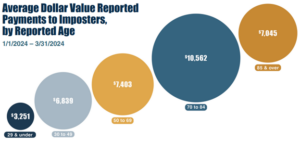Social Security’s Office of the Inspector General Releases Scam Report to Congress
Reading Time: 2 MinutesLast Updated: July 18, 2024
 Social Security’s Office of the Inspector General (OIG) recently released its quarterly Scam Report to Congress. The report provides information about scam trends in the second quarter of Fiscal Year 2024 (January 1 — March 31, 2024).
Social Security’s Office of the Inspector General (OIG) recently released its quarterly Scam Report to Congress. The report provides information about scam trends in the second quarter of Fiscal Year 2024 (January 1 — March 31, 2024).
“As public servants, we must use every tool at our disposal to raise awareness and protect the American people against Social Security imposter scams,” Commissioner Martin O’Malley said earlier this year when announcing the 5th annual “Slam the Scam” Day.
Our 2024 anti-scam strategy expands education and outreach efforts to underserved and tribal communities.
Scam reports to OIG have significantly declined in the past few years. However, OIG continues to receive complaints about scammers impersonating Social Security and OIG employees via phone calls, texts, emails, social media, and U.S. mail.
Government imposters try to steal money or personal information from potential victims by contacting them about fake Social-Security related problems.
OIG received about 27,000 scam allegations in the second quarter:
- About 45% of reported cases claimed there was a problem with a person’s Social Security number.
- Nearly 17% of cases mentioned a problem with Social Security benefits.
- One-third of scams used official-looking documents or images (such as the Social Security logo).
Scammers target people of all ages. More people 50 and older lost money to government imposter scams than those under 50, according to the report. Older adults ages 70 to 84 reported the largest payments to imposters — an average loss of $10,562.

What You Can Do
To learn how to protect yourself and your loved ones, visit our Protect Yourself from Scams page. If you receive a suspicious call, text, email, social media message, or letter from someone claiming to be from Social Security:
- Remain calm. If you have a strong emotional response to the communication, take a deep breath. Talk to someone you trust.
- Hang up or ignore the message. Do not click on links or attachments.
- Protect your money. Scammers often insist they can resolve a Social Security-related problem if you pay them with a gift card, prepaid debit card, cryptocurrency, wire transfer, money transfer, or cash. These forms of payment are hard to trace.
- Safeguard your sensitive information. Don’t provide personal information to someone who contacts you claiming to be from a government or law enforcement agency, even if they know some details about you. If we need to reach you, we will mail you a letter.
- Report the scam. Use our online form to report the scam to OIG.
- Spread the word. Share your knowledge about scams and how to avoid them. Especially in underserved and tribal communities, which may not have outreach programs, you can be the link to help protect others from becoming victims.
Please share this message on social media, with friends, family, and local organizations.
Did you find this Information helpful?
Tags: equity, scams, Social Security benefits
See CommentsAbout the Author
Comments
Comments are closed.

Eddie d.
I just got a call from social security. I think it was a scam. What should I do?
Kevin A.
I canr get mt ssd started again. It’s been more then 2 years
allen d.
MetaMask is the biggest scam you can have , all my NFT and coins where stolen in a twinkle of an eye and their very rude customer care will ignore you and tell you there’s nothing they can do, Expert Bernie Doran was competent enough to help me recover my lost asset. You can reach them via Berniedoransignals[at]gmail[dot]com.
hemarsoft
This report highlights crucial information about Social Security scams and provides actionable steps for protection. The emphasis on outreach to underserved and tribal communities is particularly commendable, ensuring broader awareness and support. Excellent job on keeping the public informed and empowered against fraud! 👏🔍
other, a.
vibration on skin, thinking produces vibration on adams apple, internal cochlear (snail like ) vibration of hair (sensitive like a cat) (amp like caffeine or amp drug addicts cellular excitement potential energy) focus attention to disturbances in other local enforcement assist 3rd party unknown possible action related initiated in court dates location to developing IDENTITY from intentional homelessness, intentional disablement, disturbances in housing notes not representing actual transactions of event in real life accounting but recall RECALL retrieve in future possible action will probably institutionalize you probably in facility of psychotic, schizo, mental, dement, demonstratable further forced rx or prescriptions that originating CAUSE not required to be known. assessment not medically determined
Caroline G.
HUH?!
Terri C.
What the hell are you talking about?
Brenda
WTF!!!!!
What drugs are you doing
Gerry E.
I wish I could find someone to tell me why I did not get my back pay and there saying I’ve been over paid I only get $382.50 a month that’s before they said I was over paid I can’t live off that and I can’t live off the$288.20
S.D.
We’re sorry to hear about your situation, Gerry. For your security, we do not have access to private information in this venue. If you have been overpaid, our policy allows us to collect 10% of your total monthly payment to recover most overpayments. We encourage you to work with your local Social Security office. Or you can call us at 1-800-772-1213, Monday through Friday, 8:00 a.m. to 7:00 p.m. For more information about the overpayment process, visit our Frequently Asked Questions. We hope this is resolved soon.
Nadine
the person that posted other a on 7-19-24 @ 10:38 must be cofused.I don’t understand what he is talking about.It sounds like a bunch of jibberish to me.Please land on earth,not your continued trip in space.
Christiana H.
I don’t understand what you are saying.
other, a.
Tags: equity, scams, Social Security benefits
listed on bottom of article.
equity: equittable settlements
goods and services information considered asset
asset placed in liability
credit related debt liability in being an asset information useless meaningless
right
of use
capital lease
tenancy
division
separating
senses
physical protections in communications act
being
intangible rights to recovery of financial loss economically
intangible
government security protection in right of use domain
human body i.p. (communications able subvocal or other (subvocal)
among other things
internet neutral (common)(behavioral environment that does not require originating cause and use is determined from legal resource that separates causally in an environmental determination from a test and psychological operations ….
Maxine
I am the representative payee and guardian and also personal care representative for my son, a vulnerable adult who is disabled and unable to work. He was the target of a scam just over a year ago. Someone (unknown to us) found out his personal contact information including his Social Security Number and worked, resulting in overpayment of my son’s Social Security benefits, so he was fined and his benefits were withheld. He lost more than $2,000 in benefits. I immediately contacted Social Security because he is unable to do so, and explained that this was fraud. They did not believe me at all at first, and at least three phone calls to Social Security were required before his benefits were reinstated. He lost the $2,000 permanently. I paid his bills out of my own retirement income ($15/hour) and my own Social Security benefits.